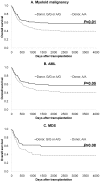Genetic variants of human granzyme B predict transplant outcomes after HLA matched unrelated bone marrow transplantation for myeloid malignancies
- PMID: 21886827
- PMCID: PMC3160316
- DOI: 10.1371/journal.pone.0023827
Genetic variants of human granzyme B predict transplant outcomes after HLA matched unrelated bone marrow transplantation for myeloid malignancies
Abstract
Serine protease granzyme B plays important roles in infections, autoimmunity, transplant rejection, and antitumor immunity. A triple-mutated granzyme B variant that encodes three amino substitutions (Q48R, P88A, and Y245H) has been reported to have altered biological functions. In the polymorphism rs8192917 (2364A>G), the A and G alleles represent wild type QPY and RAH mutant variants, respectively. In this study, we analyzed the impact of granzyme B polymorphisms on transplant outcomes in recipients undergoing unrelated HLA-fully matched T-cell-replete bone marrow transplantation (BMT) through the Japan Donor Marrow Program. The granzyme B genotypes were retrospectively analyzed in a cohort of 613 pairs of recipients with hematological malignancies and their unrelated donors. In patients with myeloid malignancies consisting of acute myeloid leukemia and myelodysplastic syndrome, the donor G/G or A/G genotype was associated with improved overall survival (OS; adjusted hazard ratio [HR], 0.60; 95% confidence interval [CI], 0.41-0.89; P = 0.01) as well as transplant related mortality (TRM; adjusted HR, 0.48; 95% CI, 0.27-0.86, P = 0.01). The recipient G/G or A/G genotype was associated with a better OS (adjusted HR, 0.68; 95% CI, 0.47-0.99; P = 0.05) and a trend toward a reduced TRM (adjusted HR, 0.61; 95% CI, 0.35-1.06; P = 0.08). Granzyme B polymorphism did not have any effect on the transplant outcomes in patients with lymphoid malignancies consisting of acute lymphoid leukemia and malignant lymphoma. These data suggest that there is an association between the granzyme B genotype and better clinical outcomes in patients with myeloid malignancies after unrelated BMT.
Conflict of interest statement
Figures
Similar articles
-
NKG2D gene polymorphism has a significant impact on transplant outcomes after HLA-fully-matched unrelated bone marrow transplantation for standard risk hematologic malignancies.Haematologica. 2009 Oct;94(10):1427-34. doi: 10.3324/haematol.2009.008318. Haematologica. 2009. PMID: 19794085 Free PMC article.
-
The recipient CXCL10 + 1642C>G variation predicts survival outcomes after HLA fully matched unrelated bone marrow transplantation.Clin Immunol. 2013 Feb;146(2):104-11. doi: 10.1016/j.clim.2012.11.009. Epub 2012 Dec 7. Clin Immunol. 2013. PMID: 23291247
-
CD6+ T cell depleted allogeneic bone marrow transplantation from genotypically HLA nonidentical related donors.Biol Blood Marrow Transplant. 1997 Apr;3(1):11-7. Biol Blood Marrow Transplant. 1997. PMID: 9209736
-
Bone marrow transplantation for chronic myeloid leukemia with volunteer unrelated donors using ex vivo or in vivo T-cell depletion: major prognostic impact of HLA class I identity between donor and recipient.Blood. 1995 Nov 1;86(9):3590-7. Blood. 1995. PMID: 7579468 Review.
-
Alloreactivity and the predictive value of anti-recipient specific interleukin 2 producing helper T lymphocyte precursor frequencies for alloreactivity after bone marrow transplantation.Dan Med Bull. 2002 May;49(2):89-108. Dan Med Bull. 2002. PMID: 12064093 Review.
Cited by
-
Association of GZMB polymorphisms and susceptibility to non-segmental vitiligo in a Korean population.Sci Rep. 2021 Jan 11;11(1):397. doi: 10.1038/s41598-020-79705-0. Sci Rep. 2021. PMID: 33431938 Free PMC article.
-
A common genetic variation in GZMB may associate with cancer risk in patients with Lynch syndrome.Front Oncol. 2023 Feb 20;13:1005066. doi: 10.3389/fonc.2023.1005066. eCollection 2023. Front Oncol. 2023. PMID: 36890824 Free PMC article.
-
Replication of associations between genetic polymorphisms and chronic graft-versus-host disease.Blood. 2016 Nov 17;128(20):2450-2456. doi: 10.1182/blood-2016-07-728063. Epub 2016 Oct 6. Blood. 2016. PMID: 27758874 Free PMC article.
-
Infection Complications in Hematopoietic Stem Cells Transplant Recipients: Do Genetics Really Matter?Front Microbiol. 2018 Oct 2;9:2317. doi: 10.3389/fmicb.2018.02317. eCollection 2018. Front Microbiol. 2018. PMID: 30356925 Free PMC article. Review.
-
Role of non-HLA gene polymorphisms in graft-versus-host disease.Int J Hematol. 2013 Sep;98(3):309-18. doi: 10.1007/s12185-013-1416-7. Epub 2013 Aug 15. Int J Hematol. 2013. PMID: 23949916 Review.
References
-
- Gratwohl A, Brand R, Frassoni F, Rocha V, Niederwieser D, et al. Cause of death after allogeneic haematopoietic stem cell transplantation (HSCT) in early leukaemias: an EBMT analysis of lethal infectious complications and changes over calendar time. Bone Marrow Transplant. 2005;36:757–769. - PubMed
-
- Dickinson AM, Middleton PG, Rocha V, Gluckman E, Holler E. Genetic polymorphisms predicting the outcome of bone marrow transplants. Br J Haematol. 2004;127:479–490. - PubMed
-
- Elmaagacli AH, Koldehoff M, Landt O, Beelen DW. Relation of an interleukin-23 receptor gene polymorphism to graft-versus-host disease after hematopoietic-cell transplantation. Bone Marrow Transplant. 2008;41:821–826. - PubMed
-
- Gerbitz A, Hillemanns P, Schmid C, Wilke A, Jayaraman R, et al. Influence of polymorphism within the heme oxygenase-I promoter on overall survival and transplantation-related mortality after allogeneic stem cell transplantation. Biol Blood Marrow Transplant. 2008;14:1180–1189. - PubMed
Publication types
MeSH terms
Substances
LinkOut - more resources
Full Text Sources
Medical
Research Materials


